I’m running out of friends. This isn’t a lament, trust me. I’m goofily grateful for all the friends I’ve known throughout my years on the planet. They have shown up in Orillia, Toronto, Uxbridge, Wakefield, Peterborough, and Victoria to listen to me talk about my story. It’s what the living do, apparently.
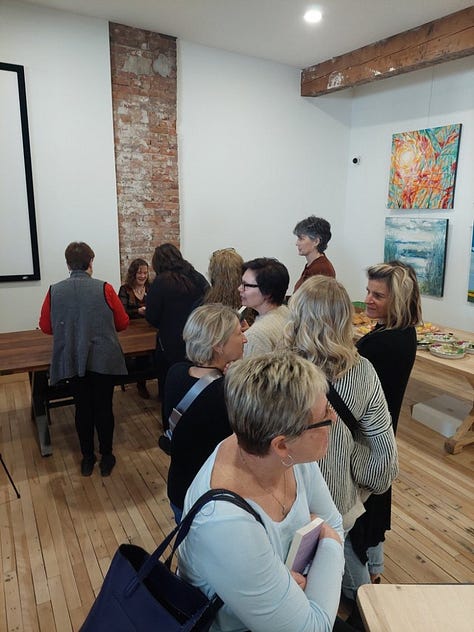
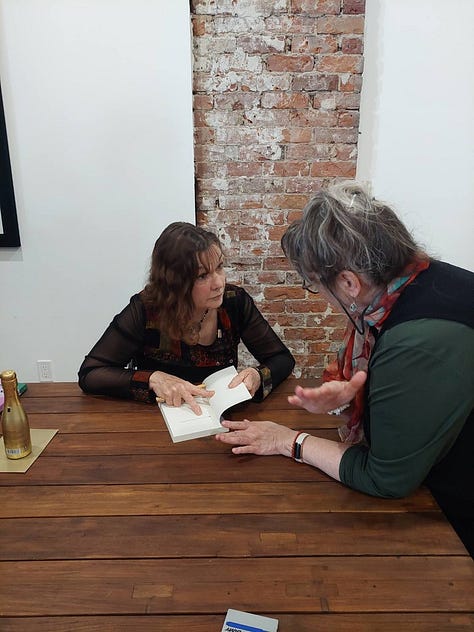
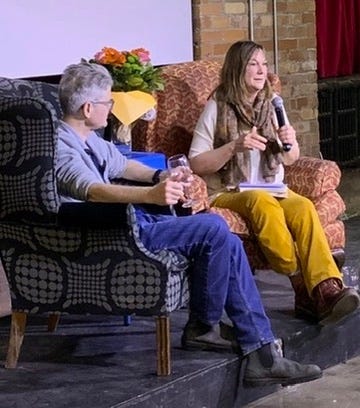
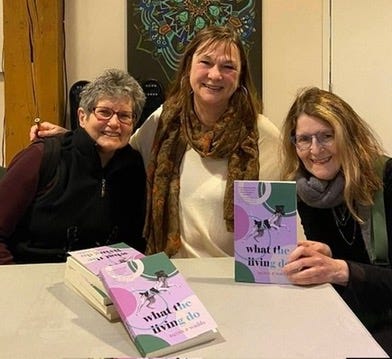
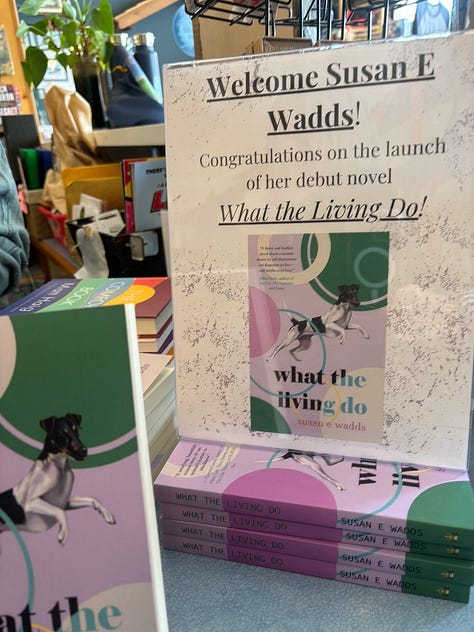
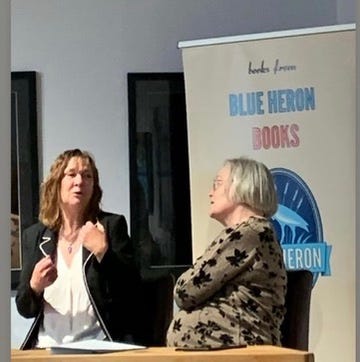
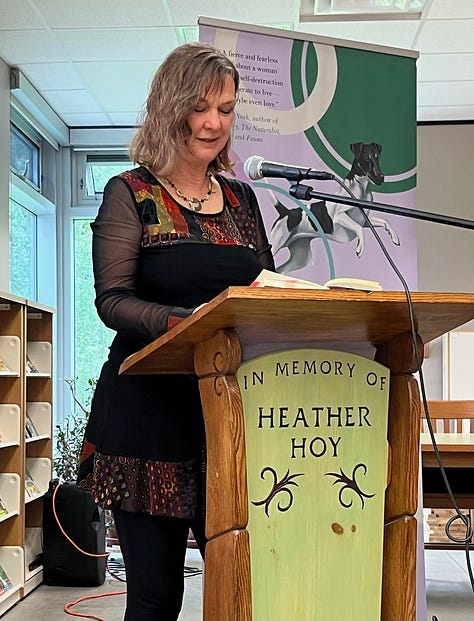
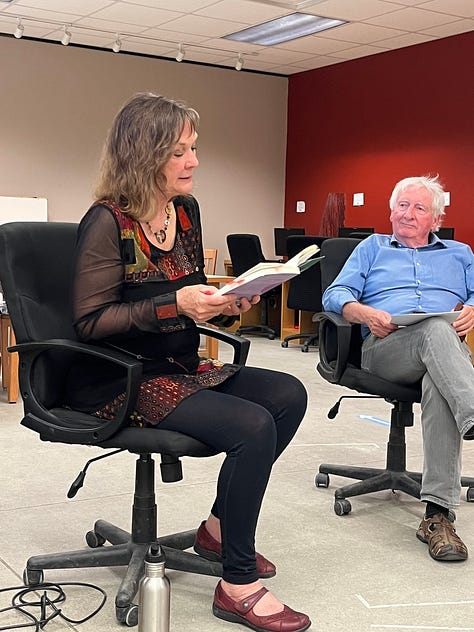
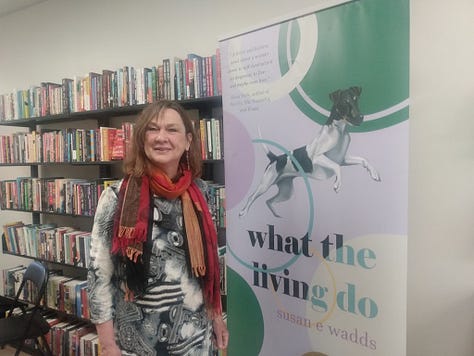
What I’ve learned about launching one’s debut novel, is that bookstores will host you if you are “local”. Otherwise, one needs to have an obvious following. Famous, in other words. They want to know that if they push their shelves to the side and possibly stay open past their hours, they want to be certain they’ll sell more than three books. Of course. Now that I’ve had six events, I get it. Who shows up? Friends. Very few attendees are strangers.
All the advice out there is to forge relationships with readers and potential readers. And keep writing. Because the market is glutted, to say the least, and advertising doesn’t reap sales (unless you’re already famous). It’s not a competition and also it is. When I recognize that this book, or any new book, is not likely to make any of those illustrious lists, or even break even with all the outlay, something inside me settles. Funny, isn’t it? That realization actually calms me down rather than creates anxiety.
On another note:
I’ve been reading As You Like It by Cliff Cardinal, a one-man theatre production. In Canada, offering a land acknowledgement before meetings, performances, and gatherings is considered mandatory. In Cardinal’s piece, he explores the underbelly of those acknowledgements. What they do and don’t mean.
During a recent Write Your Way In workshop, I wrote the following:
Cliff Cardinal asks: After you acknowledge the theft, do you DO anything? Do you give it back? Invest in Indigenous pursuits? But if you say, Yes, yes I do, you are posing as a white saviour.
For over thirty years I have lived with Indigenous people—first my husband, his children, and then and now, my son. I’ve endeavoured to hold whatever traditions and cultural understanding I have, gently and with respect. Even writing that, it appears I’m asking for approval or being defensive.
These issues are sticky and I’d prefer to find the sweet spot. I know, I write about this a lot, because it keeps coming around. Every time it does, I hold up a mirror.
Cardinal makes the point that there’s no such thing as a typical Native just as there’s no such typical white person. That was a relief to read. In What the Living Do, I wanted to underscore that. Mel is an ordinary guy who happens to be Ojibwe and does have some knowledge of the language, his wife does have some plant medicine knowledge, as well as an intuitive sense of things… as many non-Indigenous people also possess.
I have to wonder, as a “settler” do I have the right to weigh in about land acknowledgements? They’ve always felt a little empty to me, as Cardinal makes abundantly clear in this narrative. So I do what I can—and I won’t list the “good deeds” I may have done or thought to do, because that feels wrong.
I simply try to be respectful of all beings and neither romanticize nor judge anyone.
This brings me to story, and the writing of them. I’ve had this conversation with many writer friends. If I am to keep to my “lane,” do I write only CIS-gendered straightish white females? Yawn. Also, not realistic. My friends and colleagues range in ethnicity, sexual preference, and gender identity from sea to shining bloody sea. So why would I exclude them from my stories? I don’t write from their point of view, but it would be ridiculous not to include them in my stories.
In my current novel, however, I’m writing from a 51-year-old female opera singer’s point of view. Although I’ve known some opera singers, to bring her to life I must do considerable RESEARCH. In the same story, I write from the perspective of a 25-year-old man who is a pilot, which also requires substantial research. It’s the “What if…?” all good stories begin with. To imagine what it would be like to be other than one’s self, and then dive in with both feet.
Nutshell by Ian McEwan is written from the perspective of an 8-month-old fetus from inside the womb. Most of us have been such a creature but few (if any) recall the sound of our mother’s voice through the wall of skin and blood. Still… it’s a great book. Then there’s Lincoln in the Bardo by George Saunders. Also, going back a ways, I think about a miraculous book written by Yann Martell titled Self, about a man who inexplicably morphs into a woman, and eventually turns back into a man. Yes, we have to suspend disbelief, and no, I doubt it would find publication in today’s literary landscape. However… he did a brilliant job of writing from a woman’s POV.
All I’m saying is that writing stories requires imagination, curiosity and the willingness to take risks. Sometimes I feel as though I’m writing on a tightrope strung over rapids. I want to write “true” and I don’t want to flinch, but I also would like to have my future books traditionally published. Which isn’t a given.
So why, then, do I write?
I cannot write with the single aim of getting published. Or of making money (ha ha ha). Or of being famous (one extra ha, here).
I asked the marvellous app, Perplexity, this question: Why do people write novels?
Their answer:
People write novels for various reasons, some of which are:
To tell a story and share their imagination with readers. Novels provide a vast canvas to develop complex narratives, characters, and worlds that can transport readers to different realms.
As a form of creative expression and self-discovery. The process of writing a novel can help authors explore their thoughts, emotions, and perspectives on life in a profound way.
To entertain and provide an escape for readers. Novels offer immersive experiences that can captivate readers and provide a temporary reprieve from their daily lives.
To develop empathy and understanding. By delving into the lives of diverse characters, novels can help readers gain insights into different experiences and perspectives, fostering empathy and broadening their worldview.
As a personal challenge and sense of accomplishment. Writing a novel is a significant undertaking that requires dedication, perseverance, and skill. Completing a novel can be a source of pride and personal fulfillment for authors.
To leave a lasting legacy. For some authors, writing a novel is a way to create something enduring that can potentially outlive them and contribute to the literary canon.
Out of a love for reading and a desire to emulate the novels they enjoy. Many authors are avid readers themselves and are inspired to create their own works of fiction.
Ultimately, the reasons for writing novels are as diverse as the authors themselves, ranging from creative expression and storytelling to personal growth and a desire to connect with readers on a profound level.
And there you have it. Nowhere in that response does it indicate novels are written for money or fame.
Thank you for reading.
Now buy my book.
Please.
Local booksellers are the best, but you can purchase directly from Regal House Publishing. And there’s always US Amazon, or Canadian Amazon, Barnes and Noble, etc.
BIG NEWS: Coming soon, an audio version of What the Living Do will be available on most listening platforms.
And if you’ve read What the Living Do and have some thoughts, I’d love to hear them. Here, or on Goodreads or Amazon.
And I thank you from the bottom of my hapless heart if you have done either of the above.
SIDE NOTE: The full summer schedule is up for online generative writing workshops.
Also, Spain, May 2025 writing and yoga retreat is booking up. 10 full days in a heavenly environment to snuggle into your words.
You can register HERE (All levels of wiring confidence are welcome.)
Also:
On July 4th My Body, My Bookclub will be discussing What the Living Do, and I’ve been invited. Everyone is welcome to join in.
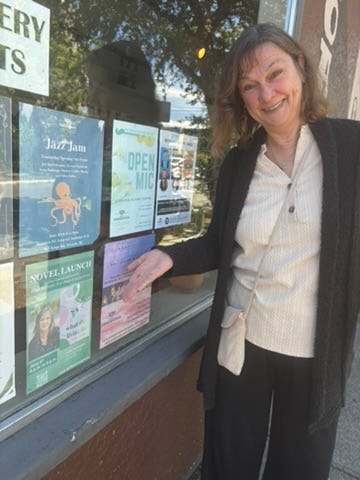
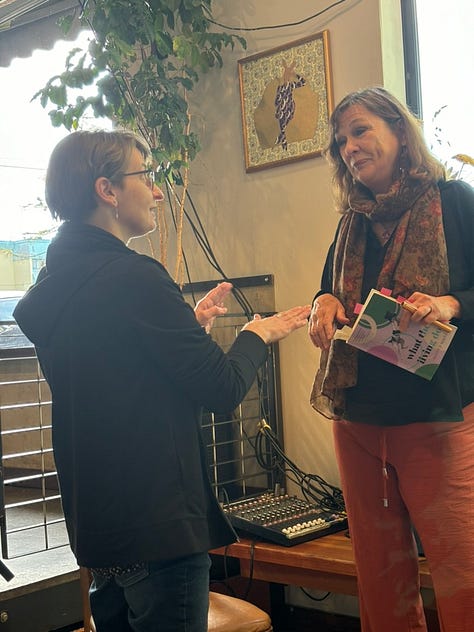
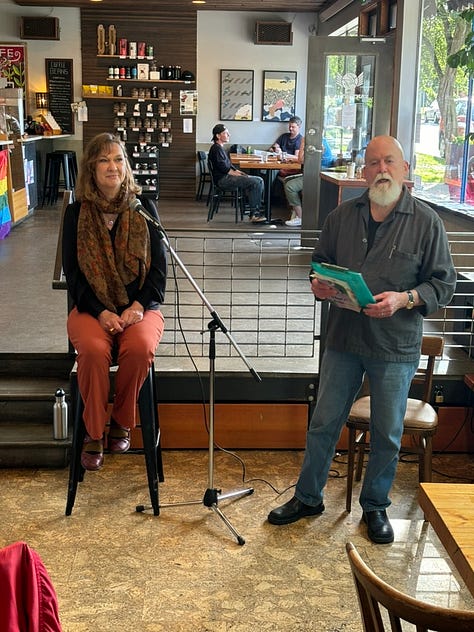
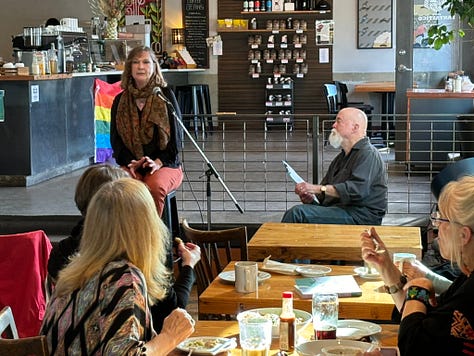
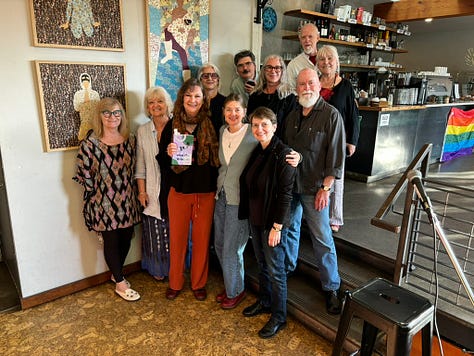
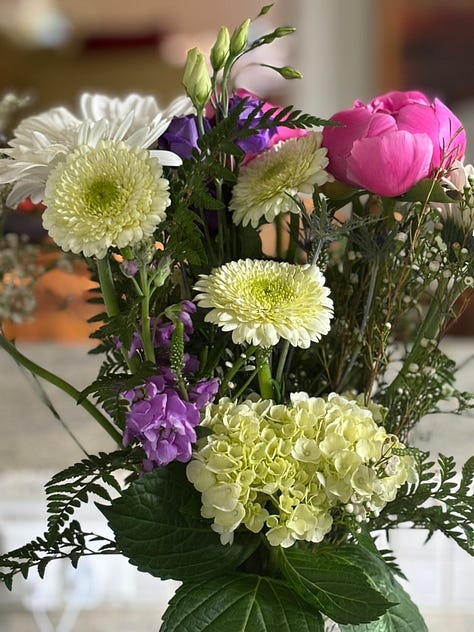





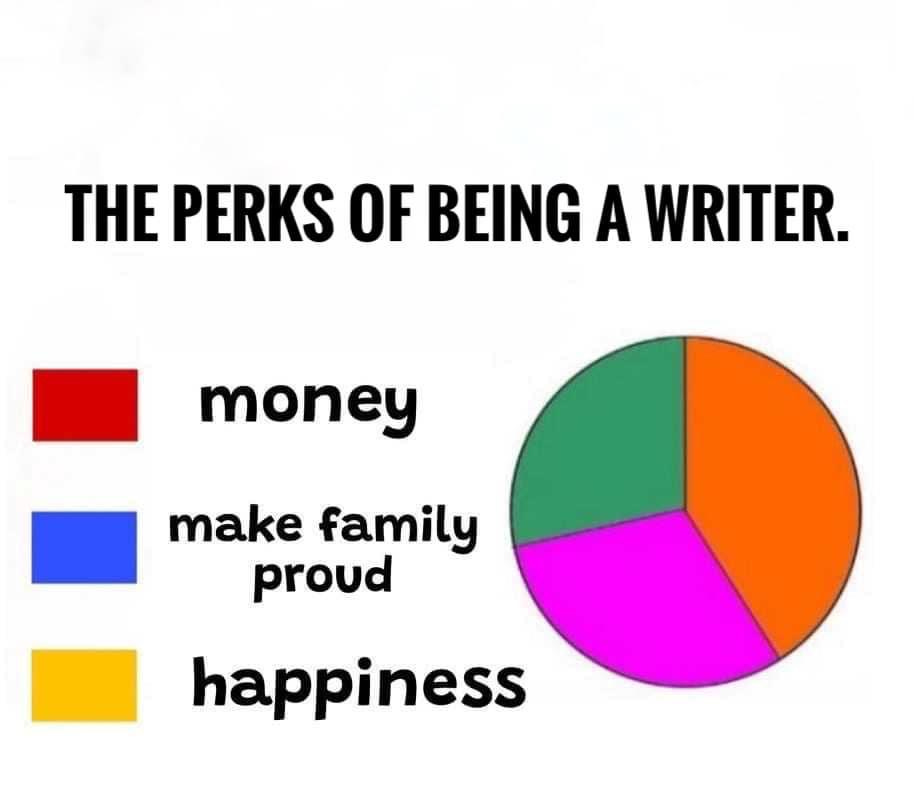
DW: “I simply try to be respectful of all beings and neither romanticize nor judge anyone.” I wonder if this is really all authors need to do, as directly as possible. There are too many competing influences to keep sorted out; too many opportunities to make respectful choices that someone will still object to - so why not just be who we are in our writing, and respond kindly and intelligently to any objections we stir up? Assuming, of course, we’re not deliberately setting out to offend any subset along the way. Kindness toward the big picture always matters.
Interesting thoughts about what we’re “allowed” to write about. It sure would be boring if everyone had to write from and about their own lane. What music would we be listening to if that were the case? I bought your book, am enjoying it, and have talked to others about it. I would like to read the book you mentioned about land acknowledgements.